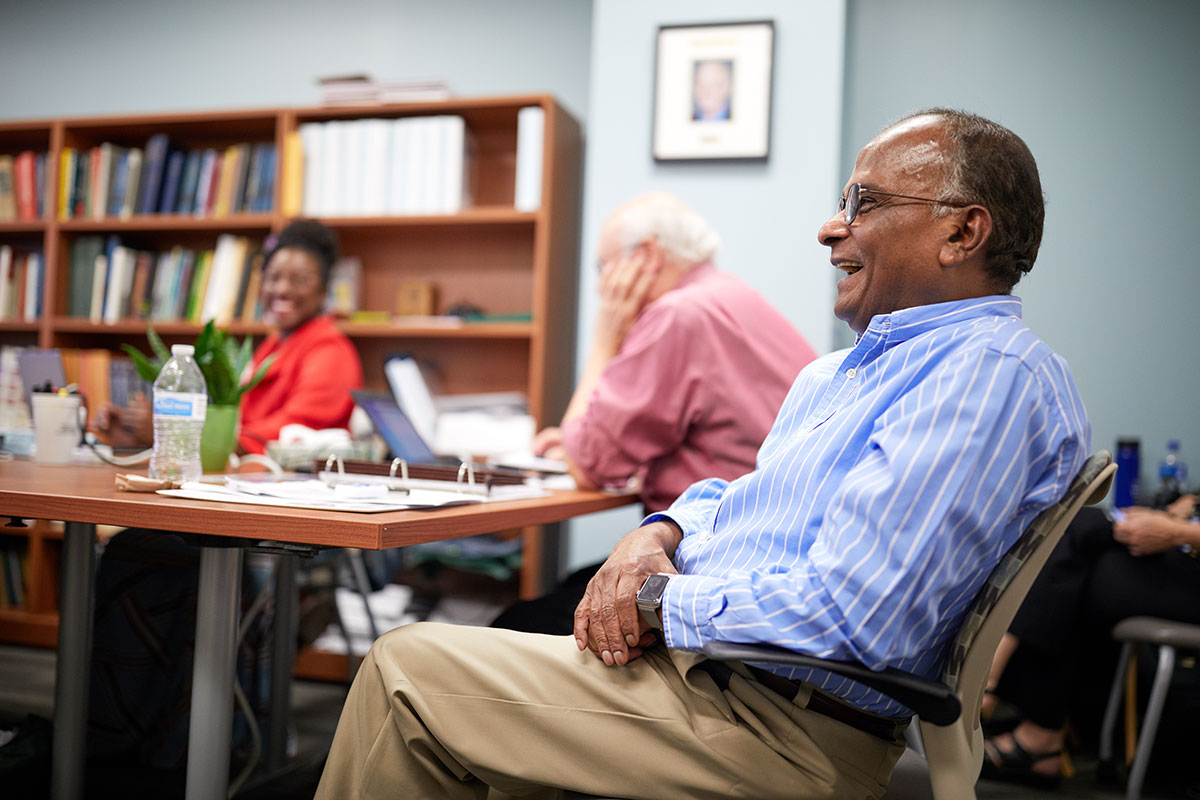Washington University School of Medicine in St. Louis has received two grants totaling $4.6 million to support a training and mentorship program aimed at increasing the diversity of the U.S. biomedical research workforce.
The two grants — from the National Heart, Lung, and Blood Institute (NHLBI) of the National Institutes of Health (NIH) — provide five more years of support for an intensive summer institute designed to provide research training, mentorship and guidance in grant writing and career development to underrepresented minority researchers who come to the School of Medicine from across the country.
The institute, called Programs to Increase Diversity Among Individuals Engaged in Health-Related Research (PRIDE), began at the School of Medicine in 2006, when the NHLBI first launched the program, then called the Summer Institute Program to Increase Diversity. It is one of nine similar summer institutes at different universities across the country.
The School of Medicine’s program is focused on cardiovascular disease, genetics and epidemiology, and is co-led by cardiologist Victor G. Davila-Roman, MD, a professor of medicine, of anesthesiology and of radiology; and biostatistician D.C. Rao, PhD, director of the Division of Biostatistics and a professor of biostatistics, of genetics and of psychiatry. Treva K. Rice, PhD, a professor of biostatistics and of psychiatry, serves as the principal investigator of the coordinating center for the program nationally.
“We hope to help improve minority representation among scientists conducting medical research and, by extension, improve the diversity of the science being conducted and of the patients who participate in clinical trials,” Davila-Roman said. “When we make conclusions about treatments based on data from nonminority populations, those treatments may or may not work in minority groups.”
Members of minority groups — including African Americans, Hispanic Americans or Latinos, American Indians, Alaska Natives, Native Hawaiians and Pacific Islanders — make up 32% of U.S. residents but comprise only 8% of the faculty at U.S. medical schools. The program’s goal is to increase the number of minority faculty engaged in biomedical research at academic institutions across the country. The program provides training, mentorship and networking opportunities for minority researchers in an effort to help overcome barriers that make it more difficult for them to be successful in academic research environments historically dominated by white men.
“Being an academic scientist who is also a minority can be isolating — you probably don’t know many people in your family or your community who do this kind of work,” said Ashira Blazer, MD, an assistant professor of medicine at New York University Langone School of Medicine and a participant in the most recent PRIDE group that came to Washington University. “It can really feel like you’re trying to put something together without a manual. The PRIDE program offers that manual. There are other people just like you, and it offers this support scaffolding — mentors and a rule book — that you didn’t necessarily have before. It was an incredibly valuable experience and renewed my commitment to this career.”
Data suggest a connection between health disparities — worse measures of health and treatment outcomes in minority groups — and the fact that such minority groups are underrepresented in the community of people conducting biomedical research.
“More diverse faculty will ask more diverse research questions,” Rice said. “There is a tremendous need to understand why African Americans and other minority groups do not do as well as their white counterparts in measures of health and disease. These are complicated questions that may involve biology, and also incorporate differences in social, economic and environmental stresses that are unique to minorities. Having a biomedical research workforce that implicitly understands these issues and accounts for them in their study designs is imperative for closing the gaps in health outcomes.”
Blazer studies the autoimmune disorder lupus, which causes inflammation that can affect tissues and organs throughout the body. It tends to be more severe in people of African ancestry. The reasons for this increased severity are unclear, and Blazer is pursuing research that could shed light on the genetic differences that may be playing a role.
“Understanding lupus is my passion,” Blazer said. “As someone who is African American and who has a number of family members who have lupus, I’ve always been interested in the possible biological reasons that people of African ancestry have a more severe disease course than people of other backgrounds. There is a gene mutation in a specific protein I’m interested in — called apolipoprotein L1 — that is only present in people of African ancestry, and I’m studying that genetic mutation to see what impact it might have on the inflammatory processes that lead to cardiovascular disease, which is also worse in African American patients with lupus.”
Another PRIDE participant, Jada Lynn Brooks, PhD, an assistant professor of nursing at the University of North Carolina at Chapel Hill, is interested in understanding the gaps in cardiovascular health among American Indian populations. Brooks comes at the research from a unique perspective as both a research scientist and as a member of the Lumbee tribe of North Carolina, the largest American Indian community east of the Mississippi River.
“Being a part of the community gives me insight into the problems that I’m interested in studying and helps me understand the context in which exposures to environmental pollutants might occur,” Brooks said. “That knowledge highly informs my research. The PRIDE program, especially the faculty mentors, really pushed me to think outside the box in terms of how to obtain pilot data regarding the questions I’m interested in, which is so important to an early-career scientist.”
 MATT MILLER
MATT MILLERThe beginning of an academic research career is a challenging time. New faculty must publish new research findings but often lack the grant funding to support independent research programs that result in novel discoveries. The PRIDE program offers participants a small amount of funding to conduct small studies and gather pilot data, demonstrate that their ideas are worth pursuing and increase the chances they will be successful in applying for larger grants in the future.
In a recent study, Davila-Roman, Rice, Rao and their colleagues showed that within two years of completing the PRIDE program, its 2017-18 participants had a 66% success rate in grant applications (123 grants awarded of 187 submitted). Over that same period, the participants also tripled the number of papers published.
The awards received by PRIDE participants included NIH research grants, training grants, and funding from outside the NIH, including the National Science Foundation, the American Heart Association, the Robert Wood Johnson Foundation, the U.S. Department of Health & Human Services and the Centers for Disease Control and Prevention.
“The success rates in grant awards and the increase in published papers suggest that the program is having a positive impact for our participants,” Rice said. “We’re pleased to receive this new round of funding to continue the PRIDE program at Washington University.”
Said Sherree A. Wilson, PhD, associate vice chancellor and associate dean for diversity, equity and inclusion at Washington University School of Medicine: “The shortage of individuals from populations who are underrepresented in the biomedical sciences is well-documented. However, the PRIDE program has shown that it is an effective vehicle for increasing diversity among the biomedical research workforce and facilitating the success of the early-career faculty researchers who participate in the program.”
The leadership committee for the program also includes Lisa de las Fuentes, MD, an associate professor of medicine and of biostatistics; Michael A. Province, PhD, a professor of genetics; Susan B. Racette, PhD, a professor of physical therapy; and Katherine Stamatakis, PhD, an associate professor of epidemiology and biostatistics at Saint Louis University.
 MATT MILLER
MATT MILLER